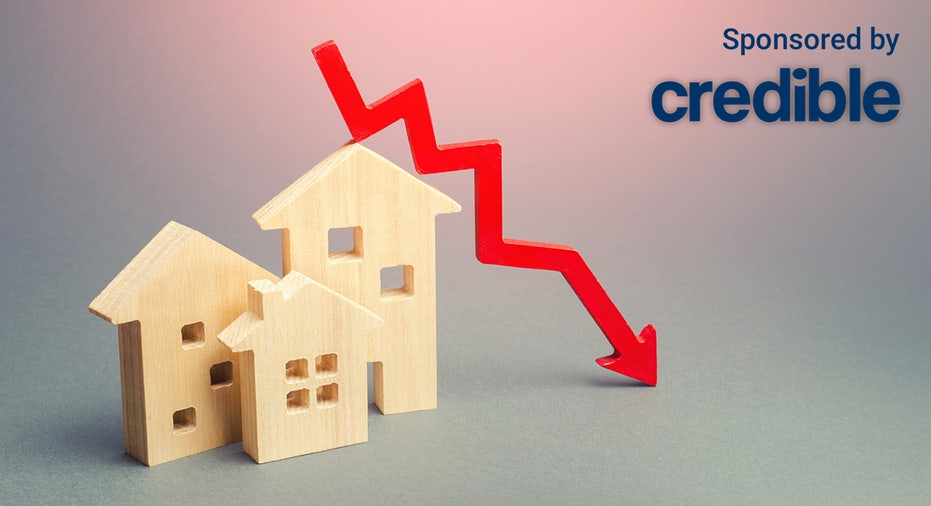Mortgage rates dropped this week, but still sit above 7%: Freddie Mac
Many homeowners struggle to make payments as number of mortgages underwater grows

Rates dropped from 7.22% to 7.09% for 30-year mortgages. (iStock)
Mortgage rates have steadily been rising over the last few weeks, but rates have finally started to dip. Rates for 30-year fixed-rate mortgages averaged 7.09% as of May 9th, Freddie Mac reported.
This is a decent drop from last week when rates averaged 7.22%. Last year at this time, 30-year mortgage rates averaged much lower at 6.35%. Mortgages with 15-year terms also saw interest rates drop. Rates fell to 6.38% from 6.47% last week. Compared to last year when rates averaged 5.75%, buyers are settling for much higher rates.
"After a five week climb, mortgage rates ticked down following a weaker than expected jobs report," said Sam Khater, Freddie Mac’s chief economist.
"An environment where rates continue to hover above seven percent impacts both sellers and buyers. Many potential sellers remain hesitant to list their home and part with lower mortgage rates from years prior, adversely impacting supply and keeping house prices elevated. These elevated house prices add to the overall affordability challenges that potential buyers face in this high-rate environment," said Khater.
To take advantage of slightly lower rates, head to Credible to start your mortgage application process.
THERE ARE NOW 550 US CITIES WHERE THE TYPICAL HOME VALUE IS $1 MILLION OR MORE
Number of homeowners underwater on their mortgage is growing
Many homeowners fit into two camps: their home equity is growing, or their mortgage is now underwater.
More mortgages are seriously underwater in the first few months of April, rising from 2.6% of mortgages to 2.7%, an ATTOM report found. Homeowners go "seriously underwater" when their mortgage balance is 25% more than the property’s estimated market value.
The South had the biggest increase in underwater mortgages. Kentucky saw the largest increase, with 8.3% of homes underwater in the first quarter of 2024. Others states that saw the largest increases included West Virginia, Oklahoma and Arkansas.
On the other end of the spectrum, 45.8% of homeowners were considered equity-rich in the first quarter of 2024, according to ATTOM’s report. Comparatively, it was 46.1% in the fourth quarter of 2023 and 47.2% in the first quarter of 2023.
Although this percentage is close to half of homeowners surveyed, it’s the lowest it’s been in two years.
"Homeowner balance sheets continue to benefit in a huge way from the boom times in the form of elevated equity that can be used to help finance all kinds of things, from home renovations to business startups. Still, the windfalls are starting to erode bit by bit amid mounting signs that the market is no longer so super-heated," Rob Barber, CEO for ATTOM said.
"It’s too early to make any broad statements about the market direction, especially coming off the typically slower Fall and Winter months. But amid the recent trends, this year’s Spring buying season will be of heightened importance in telling us if there is a new long-term market pattern developing," said Barber.
If you're looking to purchase a home, consider visiting Credible to find the right mortgage rate for your financial situation and prequalify within minutes.
MORE THAN A THIRD OF GEN Z, MILLENNIALS SEEK HELP FROM THEIR PARENTS TO AFFORD A HOUSE DOWN PAYMENT
On average, homeowners spend just over 24% of their income on mortgages
Homeowners spend less of their income on their mortgage payments than they did last quarter, Realtor.com reported.
On average, households spent 24.2% of their income on their mortgage in the first three months of the year. Last quarter, homeowners spent 26.1% of their income. Although down from last quarter, this percentage is up nearly 1% from a year ago.
"We know that families are spending more to buy a home in today’s market compared with one year ago and broader historic norms," Realtor.com Chief Economist Danielle Hale said.
"As both home prices and mortgage rates have climbed, families have to choose between not buying, buying and downgrading their must-have list, or buying and putting more of their paycheck toward the purchase," said Hale.
First-time buyers often spend more of their income on their mortgage payments. These buyers typically spend 36.5% of their income, ATTOM found.
To see if you qualify for a mortgage based on your current credit score and salary, visit Credible, where you can compare multiple mortgage lenders at once.
THE 25 BEST CITIES FOR BUYERS ON A BUDGET: ZILLOW
Have a finance-related question, but don't know who to ask? Email The Credible Money Expert at moneyexpert@credible.com and your question might be answered by Credible in our Money Expert column.
